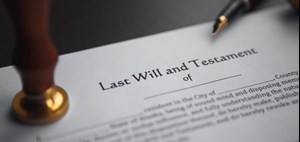Your last Will, made simple
Have you ever wondered what would happen if you didn’t leave a Will behind? It’s not something most of us want to think about, but the truth is sobering. Without a Will, your estate can become tangled in delays, family disputes, rising legal costs, and unintended beneficiaries. A Will is your way of ensuring your wishes are honoured and your loved ones are protected. The good news? Getting it right is simpler than you think.
Get the basics right
Your Will starts with you. Make sure your full names, ID number, and marital status (and regime) are listed exactly as they appear on your Home Affairs records. You’re not the only Kate Smith in the world, so let’s avoid confusion. Think of this as the “About Me” section of your legacy.
Know what's in your estate box?
Your Will only covers assets that form part of your estate, property, cars, cash, and investments like unit trusts. But retirement funds and annuities? Those are dealt with differently.
Retirement funds: Trustees, not your Will, decide who benefits under Section 37C of the Pension Funds Act.
Annuities & life cover: These pay directly to your nominated beneficiaries under insurance laws. That’s why keeping your beneficiary forms updated is just as important as drafting your Will.
Understand who gets what
Heirs inherit the residue of your estate after debts, taxes, and specific bequests have been settled. Legatees, on the other hand, receive specific assets or gifts you set aside for them. Want to leave your vintage guitar to your nephew? That’s a bequest.
Be clear, be specific, and remember: if an heir passes away before you, their children may step into their place (per stirpes).
You said, “I do,” then you had a few: Don’t forget your legal duties
Modern families are complex. Partners, children, even ex-spouses may have legal claims on your estate. A Will helps you set out exactly who should be provided for and how. Keep it clean, fair, and legally sound; it spares your family unnecessary pain later.
Protect your children
If you have minors, name a guardian; someone you’d trust with your life (because you’re literally trusting them with theirs). This acts as a safety net in case the natural guardian can’t step in. It’s a safety net, not a slight.
You should also consider creating a testamentary trust (comes into effect on your date of death) to manage their inheritance until they’re 18. Spell out how trustees should use the funds; whether for schooling, living expenses, or other priorities.
Choose the right executor
Your executor is the person or institution who will handle the full administration of your estate, from paying taxes to distributing assets. Choose wisely. They should be organised, impartial, and financially literate. A fiduciary expert is often the best choice.
Remember: executor fees are standard at 3.5% of your estate (plus VAT). It’s worth paying for peace of mind, it will ensure your estate is managed with the same level of care you gave it in your lifetime.
Sign, seal, and store
To be valid, your Will must be signed in the presence of two competent witnesses, and those witnesses cannot inherit from you. And finally, keep the original safe and easy to find. The Master of the High Court will need it and no, a scanned copy is as “good” as a paper airplane, it just won’t fly.
Final word
Drafting a Will may feel overwhelming, but it’s one of the most empowering steps you can take for your family. With clarity, intention, and the right support, you can leave behind not just wealth, but peace of mind.






